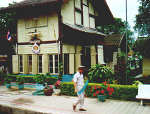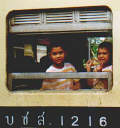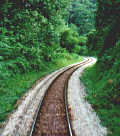“You should buy some. When they run out, they run out.” There is something ominous in the tone of the American lady’s advice. Running to the vendor’s stand beside the train, I buy a roll of toilet paper and hope she’s wrong. Clearly, novices quickly become veterans on this trip.


Every day at 2:30pm, The International Express leaves Bangkok’s Hualamphong Railway Station bound for the Malaysian seaports of Butterworth and Penang.
In no time at all we pass Bang Sue Station and the poorer suburbs of Bangkok. Across the Chao Phraya River, newly planted banana palms make a colorful screen, hiding more of Bangkok’s shantytowns. Out of the window I see children playing with an old pushbike while their brothers and sisters swim in the canal beside the rail tracks.
On the outskirts of Bangkok, after stops at Bang Bamua and Taling Clan Junction, market gardens start to appear. Ringed with tall coconut and banana palms, the neat gardens are a contrast to the chaos of the city we leave behind.
The carriage load of “farang” or foreigners have made their introductions and lapse into their own pursuits. Americans read, the English draw, Germans drink beer, the Kiwi writes, while the Swiss listen to music on their Walkmans.
Out the window, there are wondrous ancient sights to see: rusty iron-roofed huts nestled under large palm trees, neat-as-pin stations, golden Buddhist shrines and monasteries with water buffalo tethered by their horns. In the afternoon rain, a monk dressed in saffron coloured jevorn robes takes a meditational walk across a disused playing field.
In the canals beside the track masses of beautiful white Lotus flowers grow. They will become temple offerings, sold wrapped up with bundles of incense sticks, orange candles, and packets of gold leaf.
Life beside the railway changes little as the train rolls along. Village, crops, town and more crops. The railway now becomes an artery, with the sole purpose of feeding Bangkok with all the city needs to sustain the heart and capital of amazing Thailand.


Just after six my dinner arrives. I choose a pork dish with cashews. Ordering from the menu is a bit hit-and-miss. Ask the right questions, then expect something totally different, and you can’t go wrong.
At dinner, we talk about unusual meals. I start with shark’s fin soup and lumps of dried shark’s blood. Iona, the American lady, told of a friend’s experience with grilled rat. She also followed up with a delicious tale of an ant’s egg dessert. “If it doesn’t move or bark I have learned to eat it,” concluded Iona. Daniel, a Swiss writer, who cunningly purchased his dinner at one of the station stops, told of a Japanese bean dish so bitter he couldn’t stop eating. “I hated it,” he says.
The “sip-sip” vendor arrives with his bucket of ice-chilled soft drinks. He has great timing. The spicy meal has created a savage thirst. He leaves the carriage with an empty bucket and a heavy pocket.
Outside, the yellow half-light of the setting sun glistens off the rain soaked rice paddies and banana palms. Twenty minutes later, it’s dark.
As the stewards clear away dinner dishes and prepare the sleeping berths, Daniel gets ready to provide the after dinner entertainment and pulls out a didgeridoo. Where he learned to play I don’t know, but any Australian would be impressed.


As the didgeridoo’s monotone resonates through the carriage, a steward on the top bunk starts to bang on the roof, trying to find the source of this most usual vibration.
Through the night the train stops at the occasional station, where passengers wake to the soft gentle chatter of rail-side vendors, who try to entice the sleeping to 3am snacks of jelly and marshmallow.
At 6am, shortly before we arrive at Hat Yai station, the stewards begin to serve breakfast. Hat Yai is a Muslim town and the railside dishes reflect the cultural change of southern Thailand. At Daniel’s insistence, we have our second breakfast: chicken cooked with a spicy red sauce and served with sticky rice. It only cost $NZ1.00.
After breakfast, it’s time to wash. The ablution area is flooded, but cleaning your teeth is not an insurmountable task if you have your own water and wear shoes. The squat toilet is like last night’s menu – bit hit-and-miss.
Shortly after Hat Yai we arrive at the Malaysian Kastams (customs) post, situated right on the Thai-Malaysian boarder at Padong Besar, Quickly, we gather up our scattered belongings and leave the train to be inspected by Muslim Customs women dressed in traditional garb. Padong Besar is a large rice growing area and the paddies stretch away on both sides of the tracks to the distant blue hills.


Northern Malaysia is less densely populated than Thailand, but occasional groups of rice farmers hoe their fields or fix equipment on the roadside. Three men riding one small motor bike wave to us, shaking their tools in the air.
I venture into the near empty third class carriage, where the warm morning air breezes through the open windows. The experience is similar to putting your face into a hair drier. Along the flat open rice plain, our train hurtles for the next three hours. The heat begins to make any activity impossible, but Butterworth is coming and we arrive at 1:30pm. Disembarking, we head for the ferry terminal just a short walk from the station and cross the strait to Penang.
And, if you’re wondering, they didn’t run out, but a toilet roll makes an odd souvenir.
The Author
Andrew Taylor is a Cambridge freelance writer and traveled to Thailand courtesy of Thai Airways International.
Fact File

